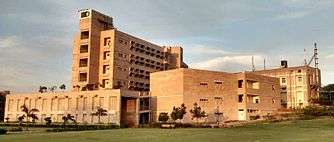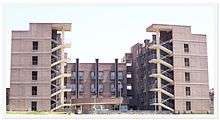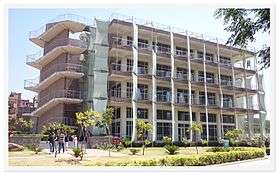Indraprastha Institute of Information Technology, Delhi
 IIIT-Delhi | |
| Type | State Technical University, Self Sustaining |
|---|---|
| Established | 2008 |
| Director | Pankaj Jalote |
Academic staff | 70 |
| Undergraduates | 1200+ |
| Postgraduates | 500+ |
| 100+ | |
| Location |
New Delhi, 110020, India 28°32′40″N 77°16′21″E / 28.54444°N 77.27250°ECoordinates: 28°32′40″N 77°16′21″E / 28.54444°N 77.27250°E |
| Campus | 25 acres (100,000 m2) |
| Colours | Pantone -HEX(#3FADA8), CMYK (71,10,38,0), RGB(63,173,168) |
| Website | www.iiitd.ac.in |
Indraprastha Institute of Information Technology, Delhi (Iṃdraprastha Sūcanā Praudyōgikī Saṃsthān Dillī, IIIT-D) is an autonomous university in Delhi, India.[1] It is a research-oriented university with a focus on Computer Science & allied areas like Mathematics, Electronics, Design, Social Science and Bioscience.
The institute began with its first batch of 60 BTech students in 2008. This first batch graduated in 2012 - the first Convocation took place in November, 2012. By that time, the institute has attracted nearly 30 faculty members, and its academic program consisted of B.Tech., M.Tech. and Ph.D. programs in CSE and ECE.
Foundation
It started at the Netaji Subhas Institute of Technology (NSIT) campus at Sector 3, Dwarka, New Delhi. It was founded as a State University[2] by an act of the Delhi Government (The IIIT Delhi Act, 2007)[3] in 2008, with seed support from the Government of NCT of Delhi.[4] The institute began with its first batch of 60 students on 8 September 2008. IIIT-Delhi moved in its permanent campus in August 2012. The campus was inaugurated by Sheila Dikshit, former Chief Minister of Delhi, in October 2012.[5]
Organisation
IIIT-Delhi was created by the Government of Delhi in 2008 as per the IIIT-Delhi Act. The IIIT-Delhi Act ensures administrative and academic autonomy. The General Council is the highest body overseeing the institute, and advises the Vice-Chancellor. The Chancellor of the Institute is the Lt. Governor of Delhi, who also chairs the General Council of the Institute. The Board of Governors consists of the Director, the Chairman, four experts, two government nominees and two professors. The Board decides the salaries, the number of positions and selects the four experts. The Senate and Board can start degrees/programs. The Senate is empowered to take all academic decisions. The Institute's operational head is the Director. Overall policy making and governance rests with the Board of Governors (BOG).[6]
Academics
IIIT-D offers an undergraduate B.Tech a postgraduate M.Tech and Ph.D in various fields.
The institute has the following academic departments:
- Department of Computer Science & Engineering
- Department of Electronics and Communications Engineering
- Department of Mathematics
- Department of Humanities and Social Sciences
- Department of Sciences
- Department of Computational Biology
Full-time faculty
The Institute is managed and organised as research groups and education programs, rather than maintaining fixed departmental boundaries. However, faculty can be broadly grouped according to their disciplines of computer science and engineering (CSE), and electronics and communications engineering (ECE). The Institute is among the few Indian institutes in which all academic staff have a doctoral degree. The institute also has a number of Guest, Adjunct and Visiting faculty members in various disciplines.[7]
Rankings
| University rankings | |
|---|---|
| General – international | |
| QS (BRICS) (2018)[8] | 181–190 |
| Engineering – India | |
| NIRF (2017)[9] | 56 |
| NIRF (2018)[10] | 66 |
| Outlook India (2017)[11] | 60 |
Internationally, IIIT-Delhi was ranked 181 to 190 among universities in the BRICS nations by the QS World University Rankings of 2018.[8]
In India, IIIT-Delhi was ranked 66 among engineering institutes by National Institutional Ranking Framework (NIRF) in 2018[10] and 60 by Outlook India in 2017.[11]
Research
Research Centres[12]
- Infosys Center for Artificial Intelligence[13] Center for AI aims to be the premier center in India for development of AI. This includes both the fundamental algorithms in AI to further basic research and also the application of AI for solving societal problems specifically in the Indian Context.
- Cybersecurity Education and Research Centre[14] Mission:
- Build systems and tools that are of direct interest to different stakeholders (Government, Industry, Citizens)
- Create a pipeline for Undergraduate, Masters, and Ph.D. students working in related areas
- Conduct high-end technical training on cyber-security for Government of India officials and corporations in topics such as secure coding, protecting critical infrastructure, privacy and security in online social media, and so on.
- Create awareness among public about Cybersecurity and privacy in India
- Centre on Computational Biology[15] The Mission of the CCB@IIITD is to conduct outstanding research at the interface of biological sciences and computer science to bridge the gap between diverse biological streams, starting from biological netweorks to molecular biology, to computational fields including algorithm development, high performance computing etc. Through these activities:
- The CCB promotes advanced computation and informatics approaches to increase our understanding of normal and disease-associated biological processes, drug development, and therapeutic responses.
- The CCB stimulates and facilitates the collaboration among medical science biologists, clinical investigators and health care researchers.
- The CCB educates the next generation of computational biologists through direct participation in research activities
Research Groups[16]
- Image Analysis and Biometrics Focus Areas: Image Processing, Pattern Recognition, Machine Learning and Biometrics
- Mobile and Ubiquitous Computing Focus Areas: Mobile Computing, Middleware, Pervasive Computing, Communication Networks, Applications in Sustainability and Healthcare, Human Sensing, Transportation, Technologies for Developing Regions.
- Software Engineering & Programming Languages Focus Areas: Software quality, programmer productivity, software maintenance, mining software process data for knowledge extraction, static and dynamic program analysis and specification mining
- Wireless Systems Focus Areas: Wifi Network Optimization, Small Cell Networks, White Spaces, Localization, Vehicular Networks, Software Defined Radio and Cellular Radiation Measurement
- Advanced Electronic Systems Focus Areas: Software Defined Radio, Multiband and Broadband RF Circuits, Smart Antenna Systems, Biomedical Electronics and Applications, Wireless Network on Chip, Biomedical System and Sensor Development, Radar Sensor Design and Signal Processing, Ground Water Sensor Design and Signal Processing
- Information Security and Privacy Focus Areas: Digital Forensics, Cryptography, Cryptanalysis, Theory and Practice of Cryptography, Cyber Crime, Privacy, Human Computer Interaction, Network Security, Traffic Analysis, Anonymity, Complex Networks, Privacy and Security in online Social Media (PSOSM), Usable Security
- Information Management and Data Analytics Focus Area: Databases, Data Mining, Mobile-P2P data management using economic models, Information Retrieval, Business Intelligence, Data Privacy and Access Control
- Theoretical Computer Science Focus Areas: Logic, Process Algebra, Reactive Systems, Verification, Cryptology, Cryptography, Machine Learning, Bioinformatics, Complexity Theory, Quantum Computation, Algorithms
- Computational and Systems Biology Focus Areas: Systems biology, Cell division cycle, Circadian rhythms, Computational cognitive neuroscience
- GeoInformatics Focus area: Geo-spatial Data Management, Data Warehousing, Database System Implementation
- Signal Processing Focus Areas: Compressed Sensing, Low rank matrix recovery, Biomedical Imaging, Information Hiding, Image & Video Forensics, Computer Vision, Image and Scene Understanding, Robust Statistical Methods, Pattern Recognition
- Scalable Systems Focus Areas: Computer Architecture, Performance Modeling of Computer Systems, Low Power Design, Energy efficient architectures, exascale computing challenges, performance portability, compilers, programming languages Distributed Systems and Networks, Concurrent and Parallel Computing
- Economics Focus Areas: Economics of Information, Consumer Privacy, Asymmetric Information in Credit and Insurance Markets, Credit Scoring
Technologies developed by our research groups are being used in multiple organizations across the country, including an IVR system to help low-literate people from rural background access information about jobs under National Rural Employment Guarantee Scheme (NREGS)a Time and Presence Based monitoring and controls system for Telecommunication Consultants India Limited (TCIL) and a Face Recognition Tool for DIT, India.
Campus

IIIT Delhi operates from its campus in Okhla Phase-III, New Delhi.[17] After its establishment in 2008, IIIT Delhi functioned from its transit campus in the library building at NSIT in Dwarka until July 2012. Its permanent campus, which is spread over 25 acres, became operational in August 2012.
The campus consists of an academic complex, a library and information center, a dining and recreation centre, and hostels. IT infrastructure includes an internet access of 1 GBPS bandwidth and a data Centre with 40 servers and 45TB storage.[18]
Arvind Kejriwal, the Chief Minister of Delhi inaugurated Phase-II of the campus on 21 August 2018.[19] New Academic Block, Lecture Hall Block, Residential (Faculty Residence) Block, Hostel Block H1, Hostel Block H2, and Sports Block are built in the campus and collectively called Phase II. The eight-storey New Academic Block which has 4 hundred-seater lecture halls, 58 labs, 116 faculty rooms and office spaces is operational since August 2017. The 11-storeyed Hostel Block H1 which has 21 married accommodation facility and 197 double-seater rooms is functional since February 2018. The Residential faculty has 12 stories with 44 flats, which are occupied since March 2018. The six-storey Lecture Hall Block with one 500-seater and two 300-seater lecture theatres, classrooms and instructions labs became functional in August 2018.
The Phase II expansion of IIIT-D will enhance its student uptake from over 1,800 in 2015 to 3,000 now.[20]
Academic Block
The Academic Complex has a total of 10 lecture halls including two lecture halls with a capacity to seat 180, one of capacity 160, two of capacity 60 and five of capacity 30. The Faculty and Research wing has a capacity of 50 faculty offices and 8 research labs, along with the PhD rooms and M.Tech labs. The administrative office and finance department offices are within the Academic block, along with the Director's Office, conference rooms, a board room, a formal seating and discussion area and faculty offices.
Hostel

IIIT Delhi provides accommodation to students wishing to reside in the hostels. At present there are two hostels, one for boys having 372 seats and another for girls having 164 seats. There is a common mess for boys and girls. The Dining and Recreation Centre houses the students' mess, a cafeteria, a common room and facilities for extracurricular activities such as a music room, table tennis and pool tables, and a gymnasium.
Library
The Library and Information Center of the Institute is housed in a separate building and is automated with the help of RFID Technology with EM security. The library is on the first floor and has a large collection of print and electronic media in areas including Computer Science, Electronics and Communications, Mathematics and Statistics, Humanities and Sciences. A common study area for students is on the ground floor and several labs are on the upper floors. There is also a reading room facility open 24 hours per day.[21]
Co-curricular activities

The Dining and Recreation centre of the institute contains a students' mess, which is spread over two floors, a cafeteria and facilities for extra co-curricular activities, such as a music room and a gymnasium.
Student council
Student Council is a main elected student’s body which supervises all clubs and festivals. It has a budget which the council distributes to various clubs. Students can form new clubs, based on interests, after formal permission of the student council.[22] The Student Senate is an elected student’s body, which focuses on academic many issues like hostels and mess Committee governance are a main part of the units.[22]
Student festivals
Technical festival
Esya[23] is a two-day national level technical festival organised by the institute, with over a dozen innovative events.[24] It was first held at the institute's transit campus on 3–4 September 2011. Esya is now an integral part of IIIT-D's annual event calendar.[25]
Cultural festival
Odyssey is the institute's cultural festival, which seeks to bring out new talent and showcase the diversity of different art forms.[26] It was first held at the institute's permanent campus on 31 January - 1 February 2014. The festival includes events in the fields of music, dance, theatre, literary and spoken arts, fine arts, digital arts, and quizzes.
Mode of Admission
B.Tech admission to various programs if IIIT-D are done through Joint Admission Counselling (JAC - DELHI) and through IIIT-D admission process using UCEED rank (only some seats in CSD) and class XII marks (only for some seats in CSSS). Admissions for foreign nationals/PIOs/NRIs will be through DASA and directly through IIIT-D process.[27]
References
- ↑ "Dikshit launches IT institute in Delhi". The Economic Times. 13 Aug 2008. Retrieved 2008-08-14.
- ↑ List of State Universities approved by UGC Page 22. Department of Expenditure. Ministry of Finance. 10 October. 2007
- ↑ "The IIIT Delhi Act, 2007" (PDF).
- ↑ "New tech varsity in Delhi by 2008". The Times of India. 2 Dec 2007. Retrieved 2009-08-14.
- ↑ http://www.iiitd.ac.in/events/new-campus-inauguration
- ↑ http://www.iiitd.ac.in/about/bog
- ↑ Faculty
- 1 2 "QS BRICS University Rankings 2018". QS Quacquarelli Symonds Limited. 2017. Retrieved 2 December 2017.
- ↑ "National Institutional Ranking Framework 2017 (Engineering)". National Institutional Ranking Framework. Ministry of Human Resource Development. 2017.
- 1 2 "National Institutional Ranking Framework 2018 (Engineering)". National Institutional Ranking Framework. Ministry of Human Resource Development. 2018.
- 1 2 "Top 100 Engineering Colleges In 2017". Outlook India. 5 June 2017. Retrieved 13 June 2017.
- ↑ "Research at IIIT-D | IIIT-Delhi". www.iiitd.ac.in. Retrieved 2016-06-01.
- ↑ "Infosys Center for AI".
- ↑ "Cybersecurity Education and Research Centr".
- ↑ "Center for Computational Biology".
- ↑ "Research Groups | IIIT-Delhi". www.iiitd.ac.in. Retrieved 2016-05-26.
- ↑ "IIIT Delhi moves into its own campus". IIIT-D Blog. 28 July 2012. Retrieved 2012-07-28.
- ↑ http://www.iiitd.ac.in/facilities/infrastructure
- ↑ "Delhi Chief Minister Arvind Kejriwal Inaugurates New Phase II Building At IIIT Delhi Campus". NDTV.com. Retrieved 2018-09-03.
- ↑ "IIIT-Delhi Phase II campus inaugurated". The Asian Age. 2018-08-22. Retrieved 2018-09-03.
- ↑ http://library.iiitd.edu.in/cgi-bin/koha/opac-about.pl
- 1 2 http://www.iiitd.ac.in/facilities/students
- ↑ "Esya' 16". esya.iiitd.edu.in. Retrieved 2016-05-25.
- ↑ http://esya.iiitd.edu.in/#
- ↑ "ESYA | IIIT-Delhi". iiitd.ac.in. Retrieved 5 Feb 2012.
- ↑ http://odyssey.iiitd.edu.in/
- ↑ naveen15064 (2016-02-26). "Admission". IIIT-Delhi. Retrieved 2018-06-26.